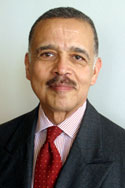ARCHIVES
OF EDITORIALS
November 20, 2003
“All black ain’t coal!”
Older African-Americans take great pride in the
elevation of another black person to high office. This is so because
of the paucity of professional opportunities during the racially
hostile times of their youth. Younger African-Americans, with
no such memories, are less likely to be as concerned by such matters.
Nonetheless, there is usually considerable ethnic support for
an African-American nominated for a seat on a federal court.
The substantial opposition of African-Americans and other liberals
to President Bush’s nomination of California Supreme Court
Justice Janice Rogers Brown to the U.S. Court of Appeals for the
District of Columbia Circuit is quite unusual. Her political conservatism
has alienated Justice Brown from most of black America.
The Congressional Black Caucus, in condemning Bush’s appointment,
stated in a letter to the Senate Judiciary Committee that Brown
is a “notoriously conservative lawyer and jurist”
who is unable to separate her own personal views from “her
responsibility to render decisions based on a fair and precedent-based
interpretation of the law and the constitution.”
Los Angeles U.S. Representative Diane Watson from Brown’s
home state was even more scathing with her criticism. She is reported
to have said, “this Bush nominee has such an atrocious civil
rights record she makes Clarence Thomas look like Thurgood Marshall.”
Opposition to the nomination has also come from a number of labor,
women’s rights, civil rights and environmental organizations.
Everyone knows of the importance of the U.S. Supreme Court, but
the U.S. Court of Appeals for the D.C. Circuit is generally considered
to be second in importance only to the U.S. Supreme Court in influencing
law and public policy in America. Congress has conferred on the
D.C. circuit concurrent or exclusive jurisdiction over the interpretation
of many federal statutes and the legality of the regulations of
many federal agencies.
Brown is a politically astute nomination for President Bush. With
the black vote about 95 percent in opposition to his election,
Bush has been trying hard to generate defections from this solid
anti-Republican bloc. Brown, a 54-year-old native of Luverne,
Alabama, the daughter of sharecroppers, could be attractive to
the black community. She moved to California and graduated from
California State University in 1974 and UCLA Law School in 1977.
She has been a judge in California since 1994 and became the first
African American woman justice of the State Supreme Court in 1996.
Brown’s views are so intemperate, right wing, and divergent
from the mainstream that the Democrats in the U.S. Senate decided
to hold a filibuster to prevent her and two others from being
approved. Black conservative Thomas Sowell described this action
as a lynching.
It must be remembered, however, that Brown opposes affirmative
action or any government preferences; believes that even racially
insulting language in the workplace is protected by the First
Amendment; supports the firing of older workers when it suits
the company; opposes wrongful termination suits of whistle blowers;
upholds the right of private property over the rights of citizens;
and sees the right to bear arms as inalienable.
Blacks have learned in their ill-advised support of Clarence Thomas
that there are some blacks whose views are alien to the common
good. The opposition to Janice Brown is a good sign. Now this
standard ought to be applied to all black politicians and black
public figures.
Home
Page

